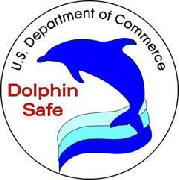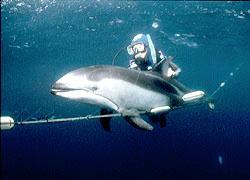|
of thousands in tuna nets before boycotts and trade embargoes forced changes in the fishery in the late 1980s and early 1990s.
The Mexican government has been lobbying for changes that would give the Mexican tuna industry access to the lucrative American market. In the mid-1990s, Mexico threatened action against the United States on the grounds that the U.S. dolphin-protection laws violate the free trade rules of the World Trade Organization.
The Commerce Department's Dolphin Safe tuna label.
(Logo courtesy NMFS)
Clinton administration officials backed the Mexican government and advocated not only for opening U.S. markets to Mexico's tuna but also for changing the definition of dolphin safe to allow tuna caught by methods that harm dolphins to be sold under the dolphin safe label. A lengthy legislative and legal battle ensued, with dolphins receiving a temporary reprieve as the Commerce Department complied with a Congressional mandate to develop a study of dolphin populations before changing the criteria for using the dolphin safe label.
The deadline for a final decision on the broad new regulations is December 31, 2002.
"A finding of no significant adverse impact is simply impossible based on these findings," said Kitty Block, special counsel to the Humane Society of the United States (HSUS) United Nations and treaties department.
"A no significant adverse impact finding would be contrary to the scientific evidence presented in the report by the government's own scientists," Block added. "The Humane Society of the United States encourages the Commerce Secretary to base this decision on science rather than politics, in which case there is clearly only one correct decision - to maintain the current standards for the dolphin safe label."
A diver from the environmental group Greenpeace
works to free a dolphin trapped underwater in a fishing net.
(Photo courtesy Greenpeace)
The HSUS and Earth Island Institute argue that the Commerce Department has delayed releasing the report on dolphins and tuna because it intends to allow sales of tuna caught by methods that harm dolphins.
"The American public deserves to know the truth about how tuna was caught," Phillips stated. "The Secretary of Commerce is posed to decide to deliberately lie to American consumers to benefit a small handful of Mexican tuna millionaires and drug lords, who would be able import tuna to the U.S. using a phony 'Dolphin Safe' label."
"All of the major U.S. and European tuna processors have pledged not to buy or sell such tuna," concluded Phillips. "American consumers won't buy tuna stained by the blood of dolphins!"
|

